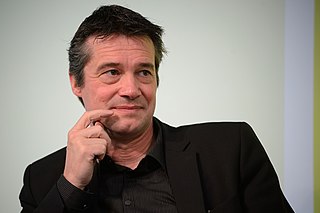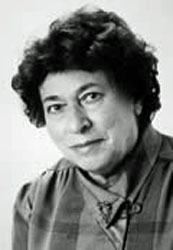You can help expand this article with text translated from the corresponding article in German. (August 2022)Click [show] for important translation instructions.
|

Angelika Krebs (born August 12, 1961, in Mannheim) is a German philosopher. [1]
You can help expand this article with text translated from the corresponding article in German. (August 2022)Click [show] for important translation instructions.
|

Angelika Krebs (born August 12, 1961, in Mannheim) is a German philosopher. [1]
Angelika Krebs studied philosophy, German literature and musicology in Freiburg, Oxford, Konstanz and Berkeley. She did her PhD with Friedrich Kambartel, Bernard Williams and Jürgen Habermas in Frankfurt in 1993. [2] Her dissertation thesis on environmental ethics won the Wolfgang Stegmüller award of the German Society for Analytical Philosophy. From 1993 to 2001 she was an assistant professor in Frankfurt, writing her habilitation thesis on work, justice and love. In 2001, she was appointed to the chair for practical philosophy at the University of Basel. [3] She was Rockefeller visiting fellow at the Center for Human Values in Princeton and Rachel Carson fellow at LMU in Munich. She served as a member of the advisory board of both the German and the Swiss Society for Philosophy. Since 2013 she has been a fellow of the European Academy of Sciences and Arts. In 2013 she co-founded the European Society for the Philosophical Study of Emotions together with Aaron Ben-Ze'ev (Haifa) and Anthony Hatzimoysis (Athens). [4]
Her main research areas are environmental ethics, political philosophy, theories of emotion and aesthetics. In environmental ethics, she argues for the intrinsic value of beautiful nature and of nature as "Heimat" [home]. In political philosophy, she propagates a humanistic alternative to standard egalitarian approaches to justice and shows why family work should be fully recognized as economic work. In emotion theory she develops a dialogical model of romantic love following Martin Buber and Max Scheler. In 2017 she edited together with Aaron Ben-Ze'ev from the University of Haifa a four-volume collection on the philosophy of the emotions. Her most recent work is in aesthetics and explores why the beauty of landscape matters. [5]
Hans Jonas was a German-born American Jewish philosopher, from 1955 to 1976 the Alvin Johnson Professor of Philosophy at the New School for Social Research in New York City.
Ernst Tugendhat was a Czechoslovakian-born German philosopher. He was a scion of the wealthy and influential Jewish Tugendhat family. They lived in Venezuela during the Nazi regime, and he studied first in Stanford University, then in Freiburg. He taught internationally in Europa and South America, with a focus on language analysis.

Otfried Höffe is a German philosopher and professor.

Rainer Forst is a German philosopher and political theorist, and was called the "most important political philosopher of his generation" in 2012, when he won the Gottfried Wilhelm Leibniz Prize. Currently he is Professor of Political Theory at the Department for Social Sciences, Johann Wolfgang Goethe University in Frankfurt. He is often identified with the newest generation of scholars associated with the Frankfurt School of critical theory. He received his doctorate under the supervision of Jürgen Habermas in 1993, with additional supervision by John Rawls from 1991 to 1992.
Irmela Hijiya-Kirschnereit is a German Japanologist and translator. In 1992 she was awarded Germany's most prestigious prize for distinction in research, the Gottfried Wilhelm Leibniz Prize.
Lutz Wingert is a German philosopher who is sometimes identified as one of the "Third Generation" of the Frankfurt School of philosophy. He is a professor of philosophy focusing on practical philosophy at the Swiss Federal Institute of Technology Zurich and a member of the Zentrum Geschichte des Wissens. He is a former student of, and a co-author with, Jürgen Habermas, a founding member of the Frankfurt School. Wingert is a former chair of practical philosophy at the University of Dortmund. Along with Wilfried Hinsch, he edits the Ideen & Argumente series.

Katharina Hacker is a German author best known for her award-winning novel Die Habenichtse. Hacker studied philosophy, history and Jewish studies at the University of Freiburg and the University of Jerusalem. Her studies in Israel have been seen as an attempt to compensate for the strong anti-Semitic feelings of her Silesian grandmother. She did not finish her studies with an academic degree. Since 1996, she has been living as a freelance writer in Berlin. In 2006, she was the second writer to be awarded the German Book Prize for Die Habenichtse. In this and other works, Hacker examines the consequences of globalization and neoliberalism on the working life, social relations, and family interactions of her German protagonists.

Friedrich Kambartel was a German philosopher.
Anselm Haverkamp is a German-American professor of literature and philosophy.

Michael Krüger is a German writer, publisher and translator.
Hans Lenk is a German rower who competed for the United Team of Germany in the 1960 Summer Olympics, and an Emeritus Professor of Philosophy. He was born in Berlin.

Angelika Overath is a German author and journalist.
Günter Abel is a German philosopher and former professor for theoretical philosophy at the Technical University of Berlin.
Hermann Karl Lenz was a German writer of poetry, stories, and novels. A major part of his work is a series of nine semi-autobiographical novels centring on his alter ego "Eugen Rapp", a cycle that is also known as the Schwäbische Chronik.
Wolfgang Schadewaldt was a German classical philologist working mostly in the field of Greek philology and a translator. He also was a professor of University of Tübingen and University of Freiburg.

Gernot Böhme was a German philosopher and author, contributing to the philosophy of science, theory of time, aesthetics, ethics, and philosophical anthropology. He is the main pioneer of German ecocriticism, the study of the relationship between culture and the environment. He has been the director of the Institute for Practical Philosophy in Darmstadt, Hesse, since 2005. Despite being one of Germany's most acclaimed public intellectuals, very little of his work has so far been translated into English.

Ingeborg Weber-Kellermann was a German folklorist, anthropologist and ethnologist. She was an academic teacher, from 1946 at the German Academy of Sciences at Berlin in East Berlin and from 1961 at the University of Marburg.

Luise F. Pusch is a German linguist. She is regarded as the co-founder of feminist linguistics in Germany, along with Senta Trömel-Plötz.

God's Zeal: The Battle of the Three Monotheisms is a book by the German philosopher Peter Sloterdijk, published in 2007. It traces the origins of Judaism, Christianity and Islam and criticises monotheism for leading to zealotry.
Otto Vossler was a German historian.